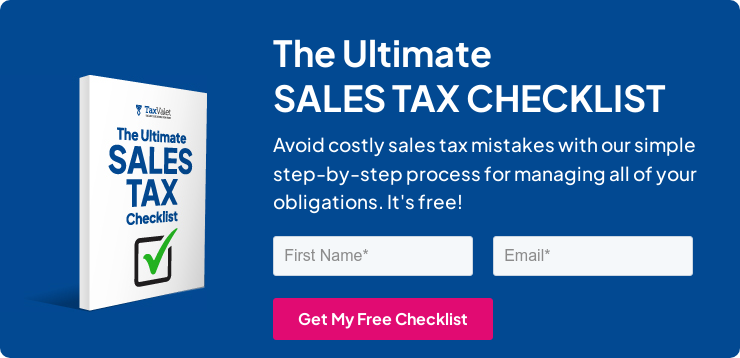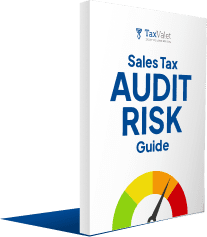At the end of Q2 2025, we surveyed business leaders across various industries to understand the challenges they’re facing and how they are dealing with them.
Their answers reveal a story of resilience, shifting priorities, and decisions that will shape the years ahead.
Here are a few highlights of what we learned:
- Across all respondents, filing and payments stand out as the one thing everyone wants done right, with growing interest in permit registrations and configuration help as teams expand.
- Inflation and supply chain pressures continue to influence strategy, alongside labor shortages and regulatory changes.
- Many businesses are looking ahead to 2026 by investing in automation, exploring new markets, and restructuring for efficiency.
Who We Heard From
The survey was presented to businesses across several industries and revenue bands. It’s not a complete picture of every US business, as the survey data was limited in scope, but it does reveal a useful snapshot of their experiences in 2025.
Survey respondents fell into the following industries:
- Retail/eCommerce (36%)
- Wholesale / Distribution (18%)
- Professional Service (14%)
- Plus smaller shares from SaaS, finance, and others.
Respondents’ businesses fell into the following revenue ranges:
- 26% under $1M
- 11% between $1M–$5M
- 31% between $5M–$25M
- 22% between $25M–$100M
- 11% over $100M
.png?width=750&height=422&name=1st%20image%20What%20industry%20best%20describes%20your%20business%20(4).png)
The Sales Tax Burden
The data gathered in this section of the report came from businesses that are not TaxValet clients. For these companies, sales tax compliance is often handled in-house, through CPAs, with software, or a mix of these.
Top Challenges
- About half pointed to the complexity of multi-state rules
- 30% cited high compliance costs
- 26% flagged the lack of support or slow response times
.png?width=750&height=422&name=2nd%20image%20What%20are%20your%20biggest%20challenges%20with%20sales%20tax%20compliance%20(3).png)
How They Manage Sales Tax Compliance
- 50% handle it in-house
- 40% use software
- 30% rely on CPAs
- 10% have fully outsourced the work
Specific to Non-Clients
.png?width=750&height=422&name=3rd%20image%20How%20does%20your%20business%20currently%20manage%20sales%20tax%20compliance%20(9).png)
How Much Time Do They Spend on Tax-Related Issues?
Specific to Non-Clients
.png?width=750&height=422&name=4th%20image%20How%20much%20time%20do%20you%20spend%20on%20tax%20related%20issues%20(4).png)
Key Economic Challenges of 2025
- Inflation (35%): Rising costs remain the most common concern, squeezing margins and forcing operators to rethink pricing and spending.
- Supply chain disruptions (27%): Delays and unpredictability continue to frustrate planning and create ripple effects throughout operations.
-
Consumer demand variability (23%): Trying to cater to ever-evolving demands from consumers is another problem many businesses are facing.
- Regulatory changes (19%): Shifting rules add another layer of complexity to already demanding workloads.
Together, these factors highlight the need for efficient, low-friction systems in every corner of the business.
.png?width=750&height=422&name=5th%20image%20What%20three%20external%20factors%20are%20currently%20impacting%20your%20business%20operations%20the%20most%20(6).png)
Import Tariffs in Focus
The survey set out to explore the full picture of how businesses are dealing with today’s pressures. However, tariffs emerged as one notable factor, particularly in how they’re reshaping supply chains and pricing strategies.
Respondents described both the intensity of their concern and the steps they’ve taken so far.
Level of Concern:
One in three respondents described themselves as extremely concerned, while others fell into the somewhat to moderately concerned range.
- Around 44% chose to pass costs to customers, delay expansions, or branch into new supply chains abroad.
- Others have moved suppliers closer to home or increased inventory as a buffer.
- And for some, the strategy was simply to wait.
FUN FACT:
TaxValet clients were more proactive than non-clients in responding to tariffs (e.g., shifting suppliers, stockpiling inventory). This suggests that offloading sales tax compliance may have freed them up to focus on bigger operational moves.
Actions Taken in Response to Tariff Changes
.png?width=750&height=422&name=6th%20image%20Have%20you%20taken%20any%20action%20in%20response%20to%20recent%20tariff%20changes%20and%2c%20if%20so%2c%20what%20have%20you%20done%20(5).png)

How Are Businesses Adapting?
Economic and sales tax challenges have forced many businesses to adapt—sometimes in quick, tactical ways, and sometimes with bigger structural changes.
When it comes to inflation and supply chains, many respondents reported adjusting pricing or inventory planning to stay ahead of rising costs.
Looking to 2026:
- 44% plan to invest in automation/technology;
- 33% in new markets;
- And 33% in restructuring for efficiency.
These responses describe a business community that isn’t standing still. Even under pressure, leaders are adjusting, testing, and building toward what comes next.
The TaxValet Client Experience
The client survey was slightly different from the one non-clients received. Instead of asking about current struggles, we asked clients to recall the challenges they faced before partnering with TaxValet, and why they chose us.
Before TaxValet:
- Nearly 80% said the lack of support and multi-state complexity was their biggest challenge.
Why they joined:
- Expertise and responsive support were the top reasons.
- Many also cited the time saved and the reassurance of audit protection.
Taken together, these responses show a clear before-and-after, from long hours and limited support to a leaner, more manageable compliance process that frees up time for other priorities.
The Most Important Factor in Choosing TaxValet
.png?width=750&height=422&name=7th%20image%20What%20was%20the%20most%20important%20factor%20in%20choosing%20TaxValet%20(1).png)
In Summary, Businesses are Resilient and Adaptable
In 2025, businesses are facing sales tax overwhelm, tariffs, inflation, supply chain headaches, labor shortages, and shifting regulations—all at once. Yet even with these pressures, most are planning proactively. They’re investing in automation and technology, exploring new markets, and restructuring to reduce friction and improve efficiency.
Is sales tax one of your friction points? If the data in this report shows us anything, it’s that there are many important places where you could be better using that energy. Handing it off to the experts at TaxValet could free you up to focus on growth.
Book a call and let’s have a look at your sales tax setup—if we’re a good fit, we’ll take the sales tax burden off your plate once and for all, so you can focus on keeping your business thriving.


Are You at Risk for a SALES TAX AUDIT?
How many businesses get audited? Which states are the most aggressive? How much could it cost you? Find out now!
Disclaimer: Our attorney wanted you to know that no financial, tax, legal advice or opinion is given through this post. All information provided is general in nature and may not apply to your specific situation and is intended for informational and educational purposes only. Information is provided “as is” and without warranty.
What you should do now
- Get a Free Sales Tax Plan and see how Tax Valet can help solve your sales tax challenges.
- Read more articles in our blog.
- If you know someone who’d enjoy this article, share it with them via Facebook, Twitter, LinkedIn, or email.